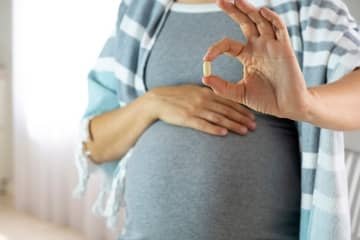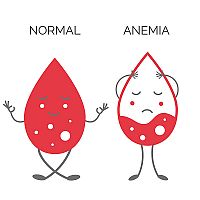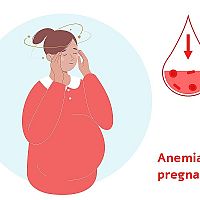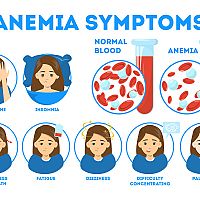
Anemia in pregnancy. Iron deficiency in the blood and its symptoms
Lack of iron in the blood during pregnancy and anemic conditions are among women's long-term nutritional problems worldwide. There are various types of anemia, which differ in their causes, but in connection with pregnancy, it is primarily sideropenic anemia, which is caused by an insufficient amount of necessary nutrients in the blood. Most often it is a lack of iron. Low iron in pregnancy is a condition that is most often caused by the increased demands of the body to supply the fetus. During pregnancy, there are changes in blood circulation. Blood volume increases and the body has increased demands for iron intake, which significantly contributes to the formation of hemoglobin. It is found in red blood cells. A lower number of red blood cells and hemoglobin means that tissue oxygenation is slowing down. How to treat anemia - anemia in pregnancy?
A growing belly is far from the only change in pregnancy. Many hormonal and biochemical processes, which are invisible to the naked eye, but take place in a woman's body, cause major changes. Ensuring fetal nutrition is key to a successful pregnancy. Optimum supply of oxygen to the fetus is a condition for the proper development of the child. For this reason too, anemia can be dangerous for a developing baby. Iron is one of the most important minerals that affect a large number of processes in the human body. It plays the most important role in the blood formation process. Anemia - anemia brings with it several unwanted symptoms. How to improve the blood count? What are the symptoms of iron deficiency? What iron is best for pregnant women?
What is anemia?
Anemia is a condition characterized by an insufficient level of red blood cells, or of hemoglobin in the blood (note: hemoglobin = protein contained in red blood cells, which binds oxygen molecules to itself). Red blood cells containing hemoglobin are responsible for distributing oxygen in the bloodstream to tissues and organs throughout the body. At the same time, they take carbon dioxide back to the lungs. When hemoglobin levels are low, it can cause insufficient oxygen supply in the body. Anemia during pregnancy is most often caused by insufficient amounts of necessary substances. Professionally, this type of anemia is called sideropenic anemia.
Anemia basically defines a state of health – due to age, sex and period of life, the amount of red blood cells and the level of hemoglobin is lower than it should be in a healthy human body under the given circumstances. In the case of women, the minimum level of hemoglobin in the blood is 120 g/l (lower limit) for men 130 g/l. During pregnancy, the level of hemoglobin in the blood should not fall below 110 g/l. The World Health Organization (WHO) considers the value of the concentration of hemoglobin in the blood below the specified value to be a condition of anemia. The observation found that pregnancy anemia also varies based on the region and the socio-economic situation of the women. Outside of pregnancy, in up to 90 percent of cases, anemia is a symptom of another disease that causes this condition. Anemias most often occur in childhood and especially during pregnancy in women.
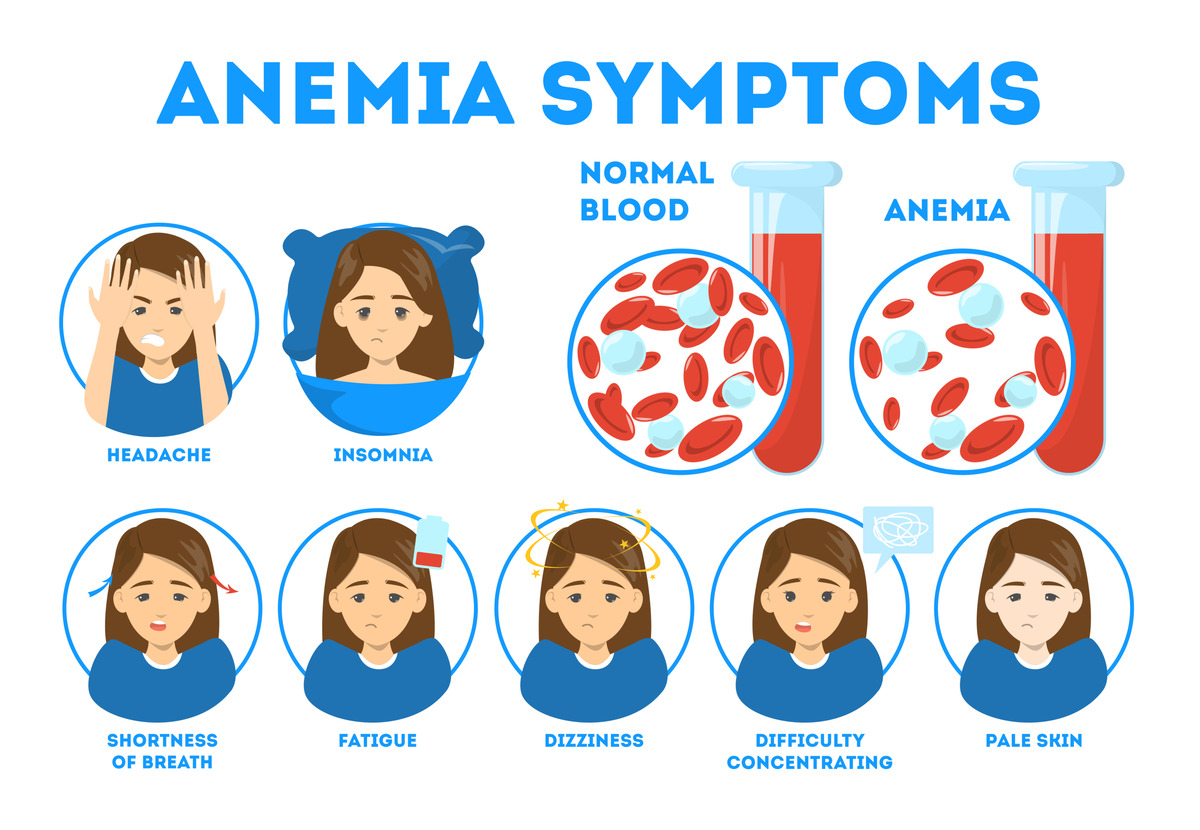
Causes of anemia in pregnancy
The most common consequence of anemia in pregnancy is a combination of a lack of necessary substances in the body and the fetus's nutritional requirements. However, it is primarily an insufficient amount of the mineral iron in the blood, which significantly participates in the blood formation process. It can also be a lack of other substances, for example folic acid, vitamin B12, magnesium, calcium or other important nutrients. This type of anemia is technically known as sideropenic anemia - iron deficiency anemia. In pregnancy, anemia is also related to a lower content of red blood cells in the liquid part of the blood plasma - a decrease in hematocrit.
Pregnancy itself significantly transforms the functioning of the female body. Various hormonal and biochemical processes adapt to the fetus and its needs. Significant changes also occur in the blood circulation. After all, already in the first trimester, the volume of blood in a woman's body increases by approximately 250 to 500 ml . This means that the heart's job is to pump a larger volume of blood, and the lungs have to keep up with supplying the blood with enough oxygen. And it is with these actions of the body that anemic conditions in pregnant women are also related. The female body has a significantly increased need for iron intake due to the requirements for the nutrition of the fetus. The higher consumption of iron in pregnancy increases very significantly in the last trimester.
A smaller amount or an exhausted supply of iron may not significantly endanger the woman or the fetus, but iron intake must be systematically increased. If it is a condition of anemia, unconditional therapy is necessary. Untreated anemia can significantly endanger the woman and the fetus. We should also not forget the risk factors for women, in whom the risk of developing anemia is an order of magnitude higher. Risk factors for anemia in pregnancy include:
- occurrence of anemia before pregnancy,
- insufficient intake of iron,
- low birth weight,
- repeated multiple pregnancy,
- consecutive pregnancies
- vegetarian or vegan diet,
- more frequent vomiting in the first trimester,
- heavy and long-lasting bleeding during menstruation,
- regular blood donation,
- young age of the mother.
Postpartum anemia is also very common. Manifestations of anemia after childbirth are often compounded due to blood loss during childbirth. In addition to sideropenic anemia due to iron deficiency, hemorrhagic anemia is also added, which arises as a result of the loss of a larger volume of blood. The symptoms of anemia are also multiplied by lactation, which consumes a larger amount of iron for its functioning. Due to the lack of this mineral, the ratio of hemoglobin and red blood cells subsequently decreases.
Risks of anemia for a pregnant woman
Anemia during pregnancy is not unusual and pregnant women encounter it very frequently. However, this does not mean that a pregnant woman will ignore its presence. Lack of iron in the blood can be responsible for other health problems. The following risks concern mainly patients with a severe anemic condition or cases where anemia is not treated for a long time. Early diagnosis is the best way to prevent the outbreak of more serious symptoms or the occurrence of more serious diseases.
Anemia often threatens the healthy course of pregnancy. Pre-eclampsia may develop and more frequent infections also occur. Statistically, anemic women struggle more with postpartum depression during pregnancy. A problem with lactation is also very common, when milk production disorders occur due to an insufficient amount of iron. Not to mention that anemia makes a woman more tired, depressed and moody, which can negatively affect the natural development of pregnancy.
Last but not least, low iron during pregnancy and the development of anemia can endanger the fetus and its development. Untreated anemia can cause premature birth or cause a low birth weight of the child, while there is a risk of delayed fetal development. The intrauterine development of the fetus can be disturbed, which can result in impaired psychomotor and psychological development. The greatest risk arises when the hemoglobin values in the blood fall below 60 g/l, when it is a severe anemia and premature separation of the placenta may occur, leading to fetal disorders or even its death and spontaneous abortion.
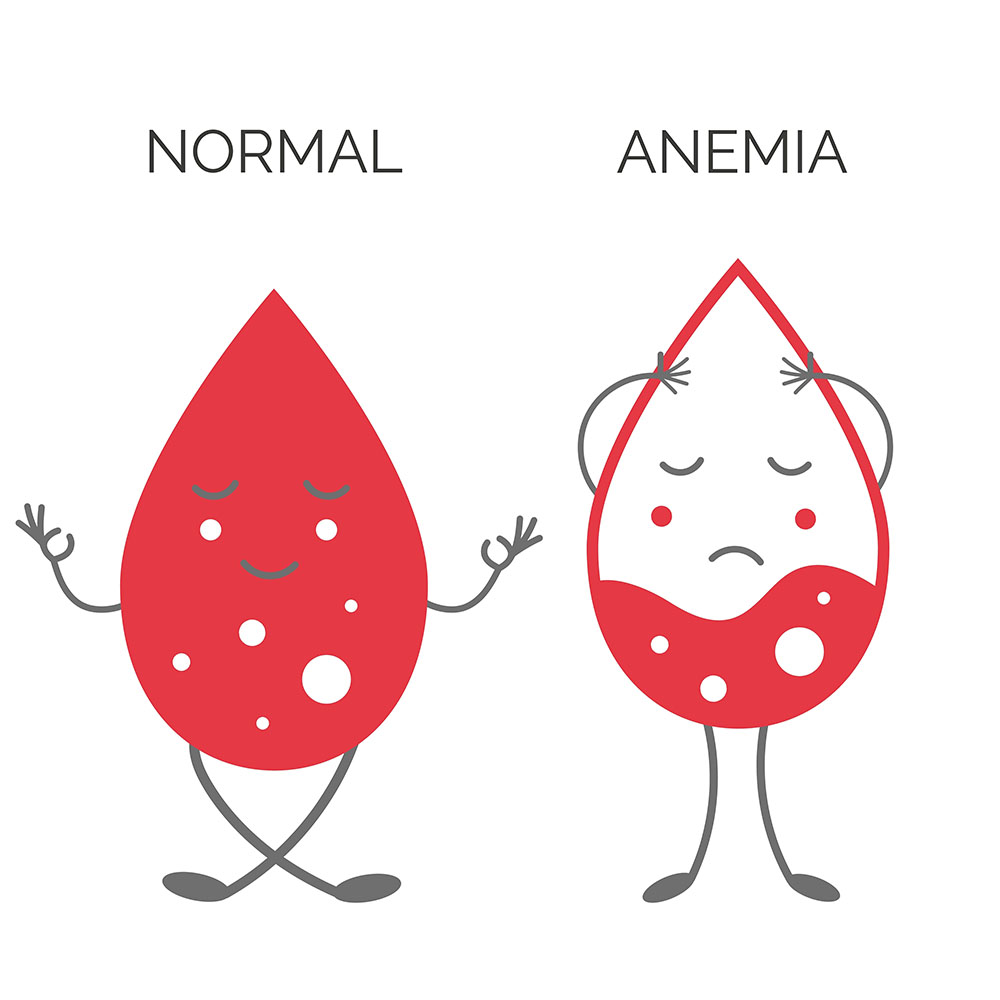
Symptoms of iron deficiency in the blood
Iron plays a very important role in the human body. After all, every single mineral or vitamin affects the processes that take place in our body. It is not for nothing that we talk about a balanced and varied diet, which is a guarantee of an optimal supply of nutrients for our body. In the case of a lack of iron in the blood, the development of anemia is highly probable. Iron plays an important role in the process of hematopoiesis in that it helps the formation of hemoglobin. That is, the blood protein that ensures the distribution of oxygen in the body. During pregnancy, its optimal level is all the more important because the fetus itself is oxygenated through the placenta and its nutrition is ensured. If the lack of iron during pregnancy is more pronounced, various symptoms of anemia may appear.
- Weakness and fatigue,
- pale skin
- heart beat,
- shortness of breath,
- Headache,
- cold feet and hands (worse circulation),
- occasional fainting and dizziness,
- low blood pressure,
- weaker weight gain.
In many cases, anemia is a signal of the presence of another disease. In that case, anemia is just a symptom of another diagnosis. It can be a hematological disease, a problem with the breakdown of red blood cells, the cause can be minor internal bleeding, inflammatory or tumor disease. In the case of anemic conditions, it is therefore always most important to find out the cause so that appropriate treatment can be started.
Diagnosis and treatment of anemia
Anemia can be diagnosed by taking blood during pregnancy. Therefore, regular check-ups during pregnancy are essential to detect possible anemia. Based on the blood count, the volume of hematocrit - red blood cells and also the concentration of hemoglobin is determined. If the blood count shows that the hemoglobin level is low (below the limit of 110 to 100 g/l) and there is little iron in the pregnant woman's blood, the doctor will prescribe treatment in the form of iron supplementation.
You can supplement iron during pregnancy by increasing the consumption of certain foods that contain a higher concentration of this mineral. Usually, however, the doctor will recommend supplementation with nutritional supplements, because the absorption of iron from the diet requires a longer process. Foods high in iron include - spinach, broccoli, legumes, nuts, tofu, cereals, red meat, offal (pork liver) and others. At the same time, meat is the best natural source of iron, as its absorption rate is around 30%. In the case of other foods, absorption is at the level of 5 to 15%. Cane molasses extract (11.1 mg/100 g) is also a good source of iron.
When using supplements, always follow the recommendations of doctors and follow the recommended dosage. Even a high dose of iron in the blood is not an optimal condition. When supplementing iron, doctors also recommend supplementation with vitamin C and the use of folic acid. There are preparations that combine these ingredients and your doctor can recommend them. While normally a woman's intake of around 18 mg of iron per day should be sufficient, during pregnancy it is recommended to increase the dose to at least 27-30 mg. While the rate of "pure" absorption is many times lower.
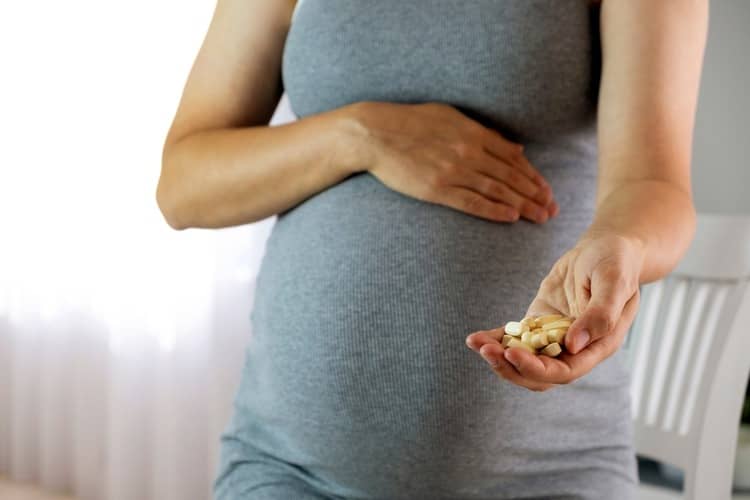
Prevention of anemia
If a woman is informed before pregnancy and is aware of what causes iron deficiency in pregnancy, the best possible way to prevent pregnancy anemia is prevention. Even before pregnancy, you can undergo a blood test to find out what the basic values of red blood cells and hemoglobin are. Subsequently, it is possible to increase the concentration of iron in the blood by adjusting the diet and consuming foods rich in iron. Or you can reach for nutritional supplements, which is often the best way to effectively help the formation of hemoglobin and to improve the blood count. Even before pregnancy, it is better to increase the intake of iron, but also other necessary minerals and vitamins for pregnant women.
Low iron in pregnancy (anemia) - experience
In discussion forums, women with anemia most often turn to more experienced mothers with the question of whether anemia poses a significant risk for the child. Several discussants reassure each other that anemia is common and if the doctor prescribes treatment, which most often consists of iron supplementation, the pregnancy will go well.
Many women pay attention to supplementation with iron and folic acid. At the same time, the discussants point out that it is advisable to increase iron intake before pregnancy or at its beginning, regardless of whether anemia appears or not. According to some women, cane molasses, meat or spinach are suitable sources of iron. Some women try to disprove other expectant mothers about the inappropriateness of using supplements during pregnancy. A number of safe food supplements containing iron are available on the market.
The most frequent questions - FAQ
Anemic conditions in pregnancy are not uncommon. Worldwide, approximately 52% of pregnant women do not have sufficient levels of iron in their blood. Statistics point to the fact that after the amount of blood in a pregnant woman's body increases, approximately 15% of women suffer from anemia. Are you also suffering from the problem of lack of minerals and vitamins? Were you diagnosed with anemia or low iron in your blood during pregnancy? How did you handle this situation? We will be happy if you share your experiences with other mothers. And maybe you will offer your own advice and recommendations related to the issue of anemia in pregnancy. Join the discussion under the article.
What causes iron deficiency?
What are the symptoms of iron deficiency in pregnancy?
Does anemia cause heart palpitations in pregnancy?
Is an excessive amount of iron in the blood a problem?
Gallery
Pridať komentár

